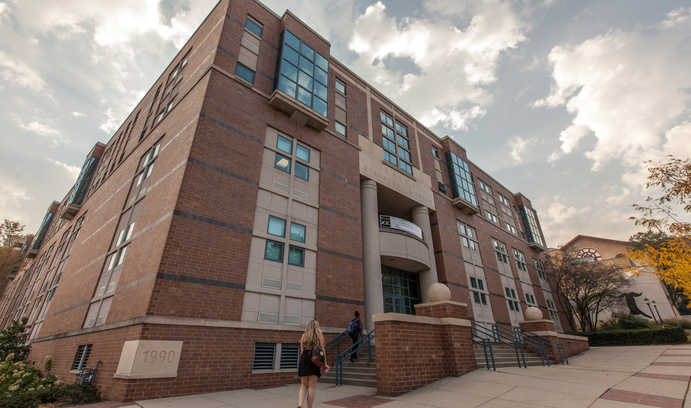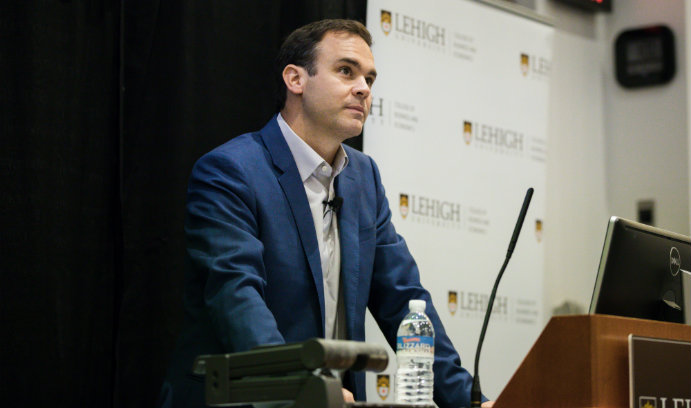Financing Strategies For “Nice” People, and More – New York News

Let’s explore some of the most interesting stories that have emerged from New York business schools this week.
When It Comes To Their Finances, Nice Guys Fall Short – Columbia Business School News
According to new research co-authored by Columbia Business School‘s Sandra Matz, “people who describe themselves as ‘agreeable’ are strongly connected to a bleak financial future—including lower savings, higher debt, and a higher likelihood of becoming financially insolvent.”
Matz elaborates, “This research proves that being nice may win friends but it can cost a lot of money. This is especially true for those who start off with less money, as they have no financial safety net to compensate for their personal habits. Unfortunately, having a nice and warm personality—in the arena of business and finances—can often have real financial costs.”
According to the article, “Agreeable individuals perceive money to be less important than their more disagreeable counterparts, and consequently have, on average, worse financial health—which is measured by savings, debt, and default behaviors.”
“Nice Guys Finish Last: When and Why Agreeableness Is Associated With Economic Hardship” was published in the Journal of Personality and Social Psychology.
You can read more about Matz’s research here.
Opportunities Abound in Distressed Debt Investing – Gabelli Connect
The Fordham University Gabelli School of Business recently hosted a talk at its McNally Amphitheatre on the subject of “distressed debt investing,” a multi-trillion dollar industry in which “investors hunt for opportunities where they can purchase debt [with the hope] that the gambit will pay off eventually.”
Attendees were privy to first-hand accounts of distressed debt investments and legal advice from a variety of experts. Baupost Group partner Fred Fogel highlights the “importance of both curiosity and perseverance.” Paul Weiss Bankruptcy and Corporate Reorganization Co-Chair Alan Kornberg “encouraged those just starting out to get a feel for the process by sitting in on bankruptcy hearings.”
Former Wachtell Lipton Bankruptcy Department Head Chaim Fortgang emphasizes the creation and maintenance of “good working relationships.”
You can read more about the talk here.
Look to Entrepreneurs For What’s Next in Healthcare – Johnson Business Feed
The Johnson Business Feed interviewed visiting faculty member Elspeth Murray about the increasing demand for innovation in the healthcare industry, from the use of smartphones to the expansion of ambulatory care.
“Consumer behavior has changed, and that will begin to push on the healthcare system. At a certain point, healthcare practitioners are either going to lose patients or be forced to adopt new ways of treating and accommodating patients.”
She advises students returning to school to focus beyond their specialty and remain “open to taking risks and re-framing your view of the industry, and to be aware of what is happening outside of your bailiwick. Take a good look around at what’s happening and go for it.”
Murray’s 2002 book, Fast Forward: Organizational Change in 100 Days, which she co-authored with Peter R. Richardson, explores how “entrepreneurial thinking gives you the creative ideas and the juice and design thinking helps you see the problems to be solved in the right way.”
Check out the rest of the Murray interview here.
The Perfect MBA Career: Portfolio Manager

If working in investment strategy seems appealing, then a job as a portfolio manager may be right for you.
Cornell Johnson Announces New Dean, and More – New York News

Let’s explore some of the most interesting stories that have emerged from New York business schools this week.
Kevin Hallock Named Dean of SC Johnson College of Business – Cornell Chronicle
The SC Johnson Graduate School of Management at Cornell University recently announced noted economist Kevin F. Hallock as its new Dean, effective December 15 and expected to run through June 30, 2024.
Provost Michael Kotlikoff explained the unique qualifications of Professor Hallock, an “expert on executive compensation, compensation design and labor markets.”
“As an accomplished economist, scholar and administrator, Kevin provides the Cornell SC Johnson College of Business with the leadership to maximize its enormous potential. His thorough familiarity with Cornell’s administrative workings is a significant asset, and the college will be well served by his deep understanding of business administration theory and practice.”
Hallock reportedly told the Cornell Chronicle that he is “grateful and excited to start this new chapter at Cornell.”
“The Cornell SC Johnson College of Business, in its infancy, faces challenges, like many new organizations, and those challenges are part of what attracted me to this role. But there is also enormous opportunity, outstanding strength and unique advantages in the college and its three schools. I am excited to work with its talented staff, students, faculty and alumni, and I am exceptionally optimistic about the future of the college.”
You can read more from the Cornell Chronicle article here.
College of Business and Economics Donates Barron’s Subscription to BASD – Lehigh College of Business and Economics News
The Lehigh College of Business and Economics recently donated a 12-month subscription to Barron’s to the Bethlehem Area School District (BASD), which Dean Georgette Chapman Phillips explains is an effort to provide “experiential learning opportunities “ to BASD students and faculty.
According to the article, Barron’s “covers global financial information, market developments, and includes a weekly summary of market activity.”
BASD Assistant Superintendent for Education and Chief Academic Officer Jack Silva explains, “The subscription will be used by students in our government and economics class. It’s a valuable resource that they can access 24/7 and supports our existing curriculum.”

Dean Phillips writes, “We are partnering with our community by sharing what we do best—business education.”
You can find out more about the donation and the business school here.
Finding Narratives in Numbers in Financial Reporting – Stevens Institute of Technology School of Business News
The Stevens Institute of Technology School of Business recently profiled Associate Professor of Accounting Dr. Elaine Henry, who’s work focuses on financial reporting as communication and recently coauthored a new Review of Accounting Studies paper on “flexibility in cash-flow classifications under the International Financial Reporting Standards.”
In an interview with the Stevens Institute of Technology School of Business News, Dr. Henry explains how they are continually inspired by the challenge that companies face to “tell their stories better and describe their economic reality more clearly.”
When it comes to financial reporting, there are stark differences between domestic and international guidelines that determine “how the underlying economic reality is portrayed.”
For instance, “under U.S. GAAP, companies must categorize interest paid, interest received and dividends received as operating cash flow, but IFRS gives companies the freedom to classify these items under operating, financing or investing cash flow. If, for example, an IFRS company chooses to classify its interest paid as a financing activity rather than an operating activity, that choice will result in the company showing a larger amount of operating cash flow—an important metric for financial analysis and valuation.”
You can read the rest of the Stevens interview with Dr. Elaine Henry here.
Cornell Introduces Grade Non-Disclosure – New York News

Let’s explore some of the most interesting stories that have emerged from New York business schools this week.
Johnson Students Vote to Enact Grade Non-Disclosure – Johnson Business Feed
After a year-long study initiated by Johnson’s Student Council to “evaluate the alignment of academics and recruiting,” Cornell Johnson students have “voted to enact a policy of grade non-disclosure” in which Two-Year, One-Year, and Johnson Cornell Tech MBA students need not “disclose their grades to recruiters until after a full-time, post-graduation job offer has been extended.”
Associate Dean for MBA Programs Vishal Gaur writes “We hope that grade non-disclosure will encourage students to take more academic risks and think holistically about their education, personal development, leadership, and the impact they want to have in the future.”
Victoria Wilmarth (MBA ’18), who is now Brigham and Women’s Hospital’s Deland Fellow in Hospital Administration believes “the vote will strengthen the school’s collaborative community.”
“This vote helps bring Johnson’s academic experiences into alignment with the school’s values. I think this will deepen students’ commitment to collaborative learning and support academic risk taking for professional and personal development.”
You can read the entire Johnson Business Feed article here.
Five New Faculty Bring Mix of Research Insight, Corporate Experience to Business School – Stevens Institute of Technology School of Business News
For the 2018-19 school year, the Stevens Institute of Technology School of Business welcomed five new professors, all of whom are well equipped to help students “think critically about technology’s role in solving business problems.”
- Assistant Professor Apostolos Filippas: “Research interests include business analytics, natural language processing, data science, online platforms and market design.”
- Assistant Professor Pranav Garg: “Studies human capital, organizational design and learning, and strategy.”
- Associate Professor Anand Goel: Formerly a Director with Navigant Consulting whose “corporate experience is enhanced by research work that has been featured in many top journals, including the Journal of Financial Economics, Review of Financial Studies, and Journal of Finance.”
- Assistant Professor Majeed Simaan: Research interests include “banking and risk management, financial networks and interconnectedness, and portfolio theory and asset allocation.”
- Assistant Professor Jordan Suchow: Formerly a “research scientist with the Berkeley Artificial Intelligence Research Lab at the University of California–Berkeley.”
You can find out more about the new hires here.
New York Times‘ David Gelles: ‘When CEOs Speak Out, the World Listens’ – Lehigh College of Business Blog
New York Times business reporter David Gelles used his keynote speech at the recent Lehigh University College of Business and Economics 2018 Impact Symposium to posit “companies can no longer afford to sit on the sidelines when it comes to the hot button issues of the day.”
“On topics ranging from climate change to health care, gun laws to birth control, the biggest brands in the country are being forced to take a stand. It’s hard to state what an abrupt change this is,” he explains.

Gelles at the recent Lehigh University College of Business and Economics 2018 Impact Symposium / Photo via Christa Neu
He adds, “Until recently, companies avoided controversy at all costs. But these days, they are confronting it head on, sometimes even embracing it when it arrives unexpectedly, and in rare instances, seeking it out.”
Gelles points to Salesforce founder and CEO Marc Benioff’s threat to relocate its Indiana office in response to a 2015 law that would have “made it easier for religious conservatives to refuse service to gay people.”
Gelles explains, “Being a chief executive no longer means just running a profit and loss statement. It means being prepared to articulate your values—and your company’s values—when you least expect it. When CEOs speak out, the world listens. Sometimes, policies even change.”
You can read more about Gelles’ speech at Lehigh here.
New Dean Will Lead Cornell SC Johnson College of Business

Economist and labor market scholar Kevin F. Hallock has been appointed dean of the Cornell SC Johnson College of Business beginning December 15, Provost Michael Kotlikoff announced yesterday afternoon. The Cornell College of Business, formed in early 2016, integrates the Samuel Curtis Johnson Graduate School of Management, the School of Hotel Administration, and the Charles H. Dyson School of Applied Economics and Management.
An experienced administrator, Hallock has served as dean and professor in the School of Industrial and Labor Relations (ILR) since 2015. His new term as dean of the College of Business was approved by the Cornell Board of Trustees executive committee and will run through June 30, 2024. Kotlikoff said in a statement that a search for a permanent ILR School dean to replace Hallock will begin immediately and an interim dean will be named next week.
“As an accomplished economist, scholar, and administrator, Kevin provides the Cornell SC Johnson College of Business with the leadership to maximize its enormous potential,” Kotlikoff said in a statement. “His thorough familiarity with Cornell’s administrative workings is a significant asset, and the college will be well served by his deep understanding of business administration theory and practice.”
Overseeing the combined schools of the Johnson College of Business is a big job. The decision to unify the three schools under a single umbrella was reached because it promised to make a wider range of opportunities available to students while also increasing Cornell’s ability to draw top recruiters and faculty. But Founding Dean Soumitra Dutta stepped down unexpectedly in February, and L. Joseph Thomas has been serving as interim dean since he left.
Hallock Brings Record of Strong Leadership
As ILR dean, Hallock’s accomplishments were many, including guiding the school through a strategic planning process, investing in student experience and well-being, and introducing a school-wide initiative to unite students, staff, and faculty around a common theme, such as “Technology and the Evolution of Work,” which has been this year’s theme. He also brings fundraising prowess, having raised resources for new investments in IRL faculty and research, expanded human resources, and a transition of ILR’s New York City office to a new home at 570 Lexington Ave, slated to open in January 2019.

Kevin Hallock, the next dean of the Cornell SC Johnson College of Business. Photo credit: Jesse Winter Photography
“Grateful and Excited to Start This New Chapter at Cornell”
Hallock said he is “grateful and excited to start this new chapter at Cornell” but realizes he has his work cut out for him.
“The Cornell SC Johnson College of Business, in its infancy, faces challenges, like many new organizations, and those challenges are part of what attracted me to this role,” he said in a statement. “But there is also enormous opportunity, outstanding strength, and unique advantages in the college and its three schools. I am excited to work with its talented staff, students, faculty, and alumni, and I am exceptionally optimistic about the future of the college.”
The College of Business notes that it has already celebrated several milestones in its first couple of years. Applications for open faculty positions in 2017-18 increased five-fold over prior years in some areas, the school reports. Not only that, more faculty who have been offered positions have accepted them than ever before, resulting in the successful hires of 20 new faculty. Undergraduate application volume at both the Charles H. Dyson School of Applied Economics and Management and the School of Hotel Administration grew by 80 percent between 2016 and 2018. Application volume at the Johnson Graduate School of Management is down just slightly year over year, less than one percentage point. This puts Johnson ahead of many of its U.S. peer business schools, which experienced even greater declines.
An expert on executive compensation, compensation design, and labor markets, Hallock’s research has focused on the complexity of executive compensation contracts and corporate performance and been featured in academic journals including The American Economic Review, the Journal of Corporate Finance and the Journal of Financial and Quantitative Analysis. The Sloan Foundation and the U.S. Departments of Labor and Education are among many organizations that have helped to fund his research.
Long History of Involvement at Cornell
A longstanding member of the larger Cornell family, Hallock joined the faculty of ILR in 2005 and became its dean in 2015. During his tenure, he also has played an active role on several university committees, including Cornell’s Financial Policy Committee, the Provost’s Budget Model Task Force, and the Cornell Student Experience Initiative’s steering committee. In 2009, he was the founding director of Cornell’s Institute for Compensation Studies.
Outside of Cornell, he has also been active as a research associate at the National Bureau of Economic Research since 2003. And in 2013, he was elected a fellow of the National Academy of Human Resources. He has consulted and served as an expert witness on issues of compensation, executive compensation, stock price reactions to labor market events, and antitrust in labor markets.
Hallock holds a bachelor’s degree in economics summa cum laude from the University of Massachusetts, Amherst, and master’s and doctoral degrees in economics from Princeton University.
Learn more about the newly appointed dean of the Cornell SC Johnson College of Business.
This article has been edited and republished with permissions from Clear Admit.
New Johnson Cornell MBA Class of 2020 Features More Women and URMs

The Cornell MBA Class of 2020 kicked off the fall semester in style earlier this month at the Johnson Graduate School of Management. To formally welcome the new recruits to the Cornell community, Johnson Business Feed revealed a comprehensive class profile, shedding light on the students who make up the incoming class.
The Johnson Cornell MBA Class of 2020

There are 280 students in the incoming students (up just slightly from last year’s 277), and they boast an average GMAT score of 699 and an average undergrad GPA of 3.4. The figures are pretty similar to the Class of 2019, where average GMAT score was 700 and average GPA was 3.36. Average work experience remains constant year over year, with incoming students bringing five years’ experience in the workforce to bear on their business school journey.
Admissions Director Judi Byers and her team have been working hard to recruit more women to Johnson, and their efforts are paying off. Women make up a full third—33 percent—of this year’s incoming class, a six-point increase over last year. The percentage of underrepresented minorities (URMs) in the Class of 2020 also grew from 12 percent last year to 15 percent with this new class. In total, U.S. minorities make up 32 percent of the new class. That figure includes Asian American, African American, Native American, and Hispanic American students.
International students, though, dipped. International students made up 34 percent of last year’s incoming class, but this year they account for only 27 percent. Johnson, like many of its peer schools, experienced a drop-off in international application volume amid widespread concerns around possible U.S. immigration and work visa restrictions. Still, they will bring perspectives from 40 different countries to the Johnson classroom. That’s up from 38 countries represented in the second-year class. There are also fewer military veterans in this year’s class—7 percent as compared to 11 percent for the Class of 2019.
In terms of undergraduate majors, former business students coming in first, making up 29 percent of the class. Social science majors make up the second largest group at 21 percent. This was followed closely by engineers, who comprise another 20 percent of the class. Humanities majors are in the minority: They represent just 10 percent of the Class of 2020.
As for previous work experience, the vast majority of the incoming class—44 percent—falls into the category of “other.” According to Johnson, this includes students who have worked in the real estate, energy, nonprofit, and transportation industries, among others. Roughly a quarter of the class—23 percent—come from finance, and another 17 percent are former consultants.
On Instagram post, Byers shares that the Class of 2020 got into the spirit of things during pre-term week, adding to the school’s shared wall of values and expectations. Community, impact, collaboration, excellence, and teamwork were among those she highlights.
Click here to view the complete Cornell MBA Class of 2020 profile.
